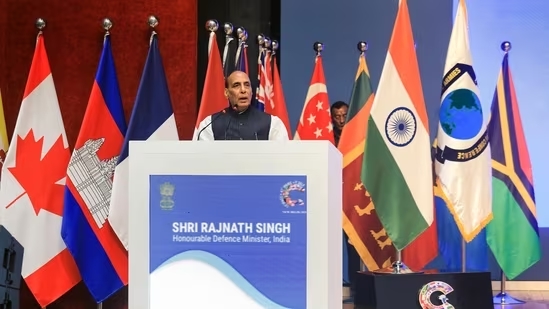Defence Minister Rajnath Singh inaugurated the 13th Indo-Pacific Armies Chiefs Conference (IPACC) in New Delhi on September 25. The Indian Army and the United States Army are co-hosting 13th IPACC, 47th Indo-Pacific Army Management Seminar (IPAMS) and 9th Senior Enlisted Forum (SELF) a three-day conference of Chiefs of Armies and delegates of 35 countries in New Delhi from September 25th to 27th, 2023 at the Manekshaw Center in Delhi.
The central theme for this forum is ‘Together for Peace: Sustaining Peace and Stability in the Indo-Pacific Region.’ The conference will provide an opportunity for Army Chiefs and senior-level leaders from land forces, primarily of the Indo-Pacific region, to exchange ideas and views on security and contemporary issues. The core effort of the forum will be to promote peace and stability in the Indo-Pacific region through mutual understanding, dialogue and friendship amongst the littoral partners.
Addressing the inaugural event, Defence Minister Rajnath Singh said, “India has always stood for a free, open, inclusive and rules-based Indo-Pacific Region, in the pursuit of shared security and prosperity. “Neighbourhood First”, has always been the cornerstone of our culture since time immemorial. India’s approach to the Region is defined by its “Act East Policy”.
The Minister also added, “The Indo-Pacific Region has emerged as a pivotal geopolitical and strategic concept in recent years, transforming from a primarily maritime concept into a comprehensive strategic framework. This transformation underscores the evolving dynamics in one of the most economically vibrant and strategically significant region of the world.”
The Minister also emphasised that the Indo-Pacific is no more a maritime construct, but a full-fledged geo-strategic construct, and the region is facing a complex web of security challenges, including boundary disputes & piracy. He explained his vision through a theoretical model by American author and speaker Stephen R. Covey, which is based on two circles – ‘Circle of Concern’ and ‘Circle of Influence’. The concept of the ‘Circle of Concern’ encompasses all matters that individuals care about, whether they are within their control or not. On the other hand, the ‘Circle of Influence’ pertains to elements that one can directly control or exert some level of influence upon.
Applying this model to the domain of international relations, the Defence Minister said that states must recognize that there are global issues and challenges and no one country can address in isolation. They need to engage with the broader international community and work collaboratively through diplomacy, international organizations, and treaties to tackle common concerns within the overlapping “Circles of Concern”. Simultaneously, states should focus on expanding their “Circle of Influence” to advance their national interests on the global stage.
Participating in the conference, Canada’s Deputy Army Chief Major General Peter Scott, said, “We’re very grateful to be here as part of the IPAC, 2023. Canada continues to look for opportunities where we can participate in training or exercises with partners in the end of the Pacific region.”
Addressing the gathering, US Army Chief Gen Randy George said, “We do face a challenging strategic environment, but this is nothing new. We have overcome challenges in the past, and we will overcome them together in the future.”














